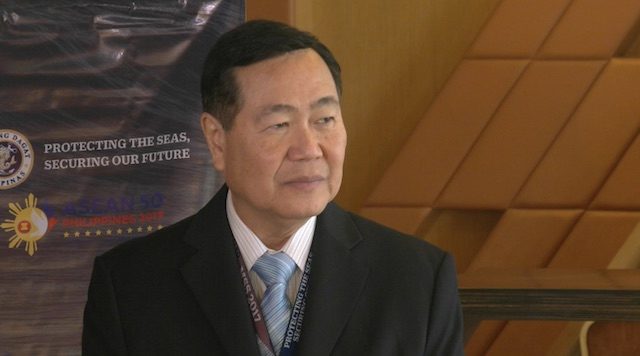SUMMARY
This is AI generated summarization, which may have errors. For context, always refer to the full article.

MANILA, Philippines (UPDATED) – Supreme Court (SC) Senior Associate Justice Antonio Carpio on Tuesday, December 5, compelled the government to submit to the court full documentation of the over 3,000 deaths in legitimate police anti-drug operations.
It was one of the requests in the consolidated petitions, and one that Solicitor General Jose Calida blasted as a fishing expedition, but which Carpio is granting as early as now.
“Can you submit to the court the following data or reports, on the 3,806 who were killed in supposedly legitimate police drug operations since July 1, 2016 and include also until end of November 2017?” Carpio asked Calida on Day 3 of the oral arguments on petitions seeking to declare police and interior drug war circulars unconstitutional.
The 3,806 deaths are among the cases wherein the police said they were forced to shoot and kill drug personalities in self-defense, or what they refer to as cases of nanlaban or fighting back.
Carpio asked for the following:
- Names, addresses, ages, gender of those who were killed
- Place, date, and time of the drug operation
- Names of the PNP team leaders and members who participated in the operation
- Pre-operation plan “or whatever is the pre-operation preparation”
- Post-operation operation
- Whether search warrants or warrants of arrest were issued
- Names of media, NGOs, or barangay officials who were present during the operation
Carpio’s list of data and documents are almost everything that the petitions are requesting for, except for the following:
- For the police to submit to the court monthly status of their investigations
- For the firearms used in the operation to be submitted to the National Bureau of Investigation (NBI) for forensic examination and safekeeping
Calida tried to argue that the consolidated two petitions – one of which is a class suit of residents of San Andres Bukid, Manila – involve killings perpetrated by masked vigilantes and not policemen.
“I believe this is the thrust of these petitions,” Calida said.
But Carpio told him that he wants the reports on all 3,806 deaths submitted to the court.
“The records must be there because these are supposedly legitimate police operations. On the deaths under investigation, you must have the names, give me, submit the names, addresses, ages and gender, you must know them because you’re investigating them,” Carpio said.
Associate Justice Benjamin Caguioa, for his part, asked Calida to submit to the court documentation of the 35 cases of killings in San Andres Bukid in Manila. He asked for pre and post-operation reports pertaining to the killings, as well as information on buy-bust operations.
The 35 drug-related deaths have been documented by Center for International Law (CenterLaw), which is leading petitioners who are seeking a protection order from the police and agents of the Philippine Drug Enforcement Agency.
In its petition, CenterLaw claimed the patterns in San Andres “show the police killings are not random and unplanned but part of a systematic design and strategy.”
Case records
The order from Carpio will now test the government’s claim that “every single one” of the deaths are being investigated.
Despite his earlier argument, Calida had no other resort but to tell Carpio: “Yes your honor, we will embody them in our memorandum.”
In his comment to the SC, Calida said that a probe into nanlaban cases would be harassing the police.
“To give due course to the petitioner’s patently baseless petitions would only serve to countenance harassment suits and ‘fishing expeditions’ that distract law enforcement agencies from their principal duties or, worse, dampen their zeal in the pursuit of criminal elements,” Calida said.
This stringency on case records has extended not only to the media, but also to the Commission on Human Rights (CHR), often lambasted by administration allies for opposing the campaign.
In September, regional police heads were quoted as saying that Police Chief General Ronald dela Rosa prohibited them from releasing spot reports to media.
The Department of the Interior and Local Government (DILG) announced in the same month that President Rodrigo Duterte instructed the PNP not to share case folders, only spot reports, with the CHR.
LOOK: Latest reply from PNP chief Director General Ronald dela Rosa states that the police can only give spot reports to the Commission on Human Rights. The release of case records “might prejudice, preempt, or jeopardize” ongoing investigations, he said. @rapplerdotcom pic.twitter.com/NfWBpjGPNG
— Jodesz Gavilan (@jodeszgavilan) December 5, 2017
During its campaign, the PNP had scrambled many times in its numbers on the drug war. They had changing terms like deaths and homicides under investigation. They had also claimed that there was only one case of extrajudicial killing but later recanted their count. – with reports from Rambo Talabong and Jodesz Gavilan/Rappler.com
Add a comment
How does this make you feel?
There are no comments yet. Add your comment to start the conversation.